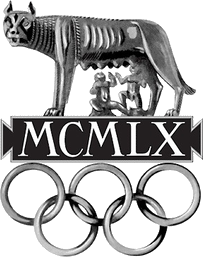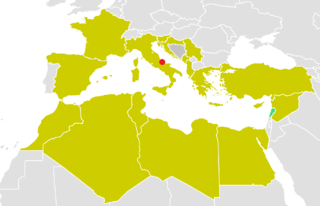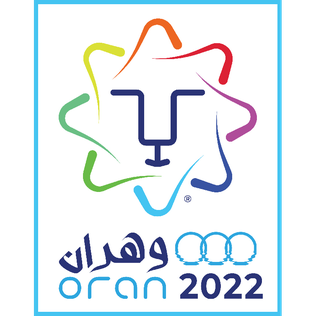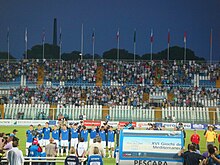
The 1960 Summer Olympics, officially known as the Games of the XVII Olympiad and commonly known as Rome 1960, were an international multi-sport event held from 25 August to 11 September 1960 in Rome, Italy. Rome had previously been awarded the administration of the 1908 Summer Olympics, but following the eruption of Mount Vesuvius in 1906, the city had no choice but to decline and pass the honour to London. The Soviet Union won the most gold and overall medals at the 1960 Games.

The Mediterranean Games is a multi-sport event organised by the International Committee of Mediterranean Games (CIJM). It is held every four years among athletes from countries bordering the Mediterranean Sea in Africa, Asia and Europe. The first Mediterranean Games were held in 1951 in Alexandria, Egypt, while the most recent games were held in 2022 in Oran, Algeria.

Albania competed at the 2009 Mediterranean Games in Pescara, Italy.

Morocco competed at the 2009 Mediterranean Games held in Pescara, Italy.
For the 1956 Winter Olympics in Cortina d'Ampezzo, Italy, a total of eight sports venues were used. All of the venues used were new or rebuilt. To make use of television coverage for the first time in the Winter Olympics, the cross-country skiing stadium was constructed to allow the best coverage. Five of the venues used for these games would appear in the James Bond film For Your Eyes Only twenty-five years later.
Gabrio Zandonà is an Italian sailor, world champion in the 470 class in 2003.

Jessica Rossi is a female Italian sports shooter. She has won Olympic gold and three world titles in the women's trap event.
Boško DraškovićTrener BK Niksic is a Montenegrin boxer. At the 2012 Summer Olympics, he competed in the Men's light heavyweight, but was defeated by Osmar Bravo of Nicaragua in the first round.

The 2013 Mediterranean Games, officially known as the XVII Mediterranean Games and commonly known as Mersin 2013, was an international multi-sport event held from 20 to 30 June 2013 in Mersin, Turkey. Mersin was announced as the host city at the General Assembly of the International Committee of Mediterranean Games (CIJM) on 23 February 2011. Mersin is the second city in Turkey after İzmir to host the Mediterranean Games. All 24 member National Olympic Committees (NOCs) of the ICMG participated in the Games. The official programme for the Games is featuring events in 27 different sports.

The 2009 Mediterranean Games, officially known as the XVI Mediterranean Games, was a multi-sport event held in Pescara, Italy, from 26 June to 5 July 2009. A record total of 3,368 athletes—2,183 men and 1,185 women—representing 23 National Olympic Committees (NOCs) participated in the Games. The number of competing NOCs was the highest in Mediterranean Games history, alongside Tunis 2001.
Francesco Miano-Petta is a retired amateur Italian freestyle wrestler, who competed in the men's super heavyweight category. He won two bronze medals in the 120-kg division at the Mediterranean Games, and finished tenth at the 2004 Summer Olympics, representing his nation Italy. Having worked as a police officer for Polizia di Stato, Miano-Petta trained full-time for the wrestling squad at VVF Padula in Naples, under head coach Luigi Marigliano.
Paolo Fucile is a retired amateur Italian Greco-Roman wrestler, who competed in the men's lightweight category. He represented his nation Italy at the 2004 Summer Olympics, and later scored a bronze medal in the 60-kg division at the 2009 Mediterranean Games in Pescara. Having worked as a police officer for Polizia di Stato, Fucile trained full-time for the wrestling squad at Gruppo Sportivo Fiamme Oro in Rome, under head coach Mauro Massaro.

The 2022 Mediterranean Games, officially known as the XIX Mediterranean Games and commonly known as Oran 2022, was an international multi-sport event held from 25 June to 6 July 2022 in Oran, Algeria. Oran was announced as the host city at the ICMG General Assembly in Pescara, Italy, on 15 August 2015. 3,298 athletes took part in the games.
The Italian Federation of Judo, Wrestling, Karate and Martial Arts (Italian: Federazione Italiana Judo Lotta Karate Arti Marziali a sports organization affiliated to the Italian National Olympic Committee.

Italy competed at the 2020 Summer Olympics in Tokyo. Originally scheduled to take place from 24 July to 9 August 2020, the Games were postponed to 23 July to 8 August 2021, because of the COVID-19 pandemic. Italian athletes have appeared in every Summer Olympics edition of the modern era, with the disputed exception of the 1904 Summer Olympics in St. Louis where one Italian may have participated.
Giuseppe Spagnoli was an Italian wrestler who won a bronze medal at the 1975 Mediterranean Games.

Angelo Crescenzo is an Italian karateka athlete who won a gold medal at the 2018 World Karate Championships. He competed in the 2020 Summer Olympics, in Men's −67 kg. He won the gold medal in the men's 60 kg event at the 2023 European Karate Championships held in Guadalajara, Spain.

The 2026 Mediterranean Games, officially known as the XX Mediterranean Games and commonly known as Taranto 2026, is a forthcoming international multi-sport event in the Mediterranean Games series that is scheduled to be held from 21 August to 3 September 2026 in Taranto, Italy. Taranto was announced as the host city at the ICMG General Assembly in Patras, Greece, on 24 August 2019.
Fabian Heidegger is an Italian former windsurfer, who specialized in the RS:X class. He represented his country Italy at the 2008 Summer Olympics, finishing among the top twenty windsurfers in his signature sailboard. Heidegger trained most of his competitive sporting career, as a member of the sailing roster for A.V.L. Caldaro, under the tutelage of his personal coach Paolo Ghione.

Silvia Semeraro is an Italian karateka. She won the gold medal in the women's kumite 68 kg event at the 2022 World Games held in Birmingham, United States. Semeraro also won the gold medal in the same event at the 2019 European Games held in Minsk, Belarus. She won the silver medal in the women's 68 kg event at the 2021 World Karate Championships held in Dubai, United Arab Emirates.






















